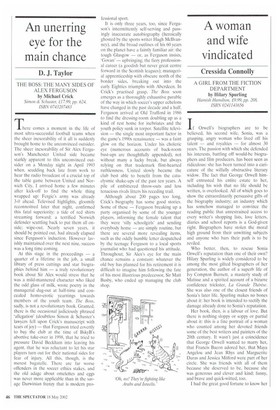An unerring eye for the main chance
D. J. Taylor
THE BOSS: THE MANY SIDES OF ALEX FERGUSON by Michael Crick Simon & Schuster, £17.99, pp. 624, ISBN 0743207483 here comes a moment in the life of most ultra-successful football teams when the sheer inexorability of it all is suddenly brought home to the unconvinced outsider. The sheer inexorability of Sir Alex Ferguson's Manchester United side became starkly apparent to this unconvinced outsider on a Monday night in April 1993 when, scudding back late from work to hear the radio broadcast of a crucial top of the table game between United and Norwich City, I arrived home a few minutes after kick-off to find the whole thing wrapped up: Fergie's army was already 3-0 ahead. Televised highlights, gloomily reconnoitred later that night, confirmed this fatal superiority: a tide of red shirts streaming forward; a terrified Norwich defender scuttling back to put them all onside; wipe-out. Nearly seven years, it should be pointed out, had already elapsed since Ferguson's induction. However lavishly maintained over the next nine, success was a long time coming.
At this stage in the proceedings — a quarter of a lifetime in the job, a small library of press cuttings and star biographies behind him — a truly revolutionary hook about Sir Alex would stress that he was a mild-mannered character who liked the odd glass of milk, wrote poetry in the managerial dug-out at half-time and concealed honto-erotic yearnings towards members of the youth team. The Boss, sadly, is not a revolutionary book. Granted, there is the occasional judiciously phrased 'allegation' (doubtless Simon & Schuster's lawyers fell upon Crick's manuscript with tears of joy) — that Ferguson tried covertly to buy the club at the time of BskyB's abortive take-over in 1998, that he tried to pressure David Beckham into leaving his agent, that he was reluctant to let his star players turn out for their national sides for fear of injury. All this, though, is the merest bagatelle. There are far worse offenders in the soccer ethics stakes, and the old adage about omelettes and eggs was never more applicable than in the savage Darwinian frenzy that is modern pro
fessional sport.
It is only three years, too, since Ferguson's intermittently self-serving and passingly inaccurate autobiography (heroically ghosted by the sports writer Hugh McIlvanney), and the broad outlines of his 60 years on the planet have a faintly familiar air: the tough Glasgow — or, as Ferguson insists, 'Govan' — upbringing; the fiery professional career (a goodish but never great centre forward in the Scottish leagues); managerial apprenticeship with obscure north of the border sides, breaking out into the early Eighties triumphs with Aberdeen. In Crick's practised grasp, The Boss soon emerges as a thoroughly exhaustive parable of the way in which soccer's upper echelons have changed in the past decade and a half. Ferguson arrived at Old Trafford in 1986 to find the dressing-room doubling up as a kind of rest home for inebriates and the youth policy sunk in torpor. Satellite television — the single most important factor in the game's 1990s renaissance — was a faint glow on the horizon. Under his choleric eye (numerous accounts of back-room bust-ups are thoughtfully appended), not without many a lucky break, but always relying on that trademark flint-hearted ruthlessness, United slowly became the club best able to benefit from the cataclysmic shake-ups of the past ten years. A pile of embittered throw-outs and less tenacious rivals litters his receding trail.
Although about 200 pages too long, Crick's biography has some good stories. Some of these — Ferguson breaking up a party organised by some of the younger players, informing the female talent that they were 'silly schoolgirls' and sending everybody home — are simply routine, but there are several more revealing items, such as the oddly humble letter despatched by the teenage Ferguson to a local sports journalist who had questioned his attitude. Throughout, Sir Alex's eye for the main chance remains a constant: whatever the old boy has planned for his retirement it is difficult to imagine him following the fate of his most illustrious predecessor, Sir Matt Busby, who ended up managing the club shop.














































































 Previous page
Previous page